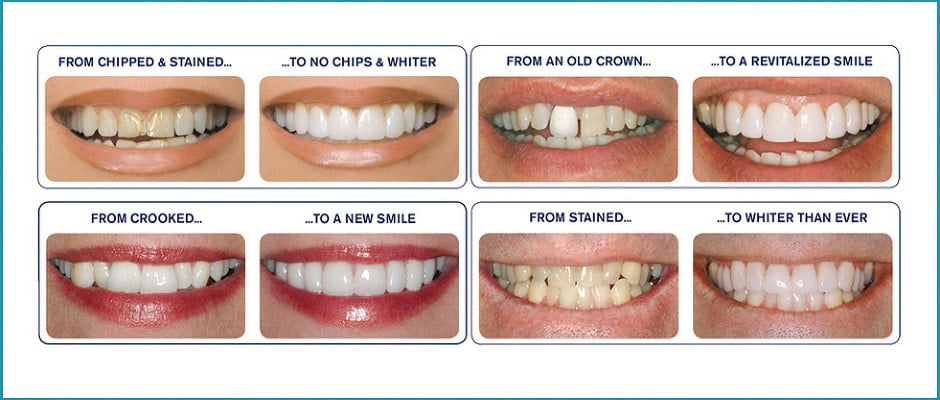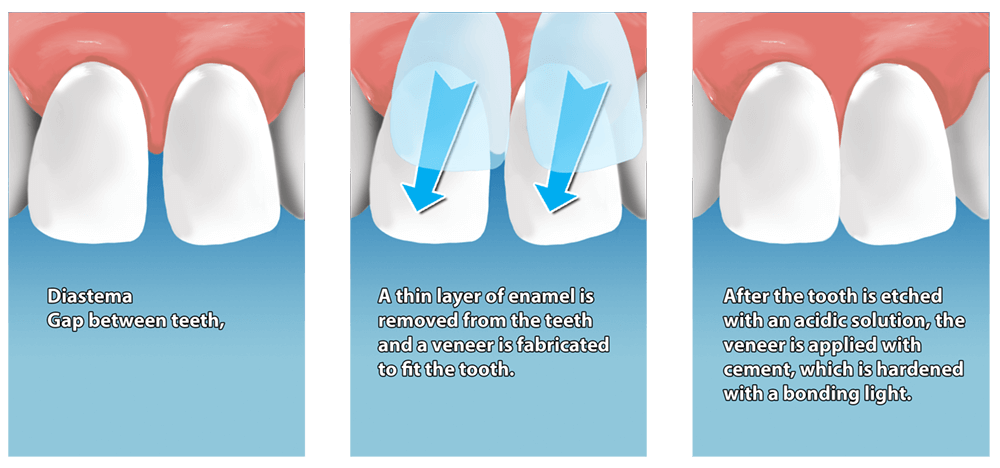Dental veneers, which are occasionally referred to as dental porcelain laminates or porcelain veneers, are wafer-thin shells of tooth-coloured material that is seamlessly bonded to the front of your teeth’s surface. Most often done for cosmetic reasons, dental veneers change the colour, size, shape, and/ or length of your teeth, improving your appearance.
Dental veneers are typically made from a porcelain or resin composite material, which are both discussed in-depth below. Your dentist will help you decide on the best veneer material based on your circumstances, preferences, and budget.
Who Will Benefit from Dental Veneers?
There are plenty of people who will reap the rewards of dental veneers, including those who have:
- Discoloured or stained teeth, regardless of the reason
- Chipped or broken teeth
- Worn down teeth
- Teeth with large gaps between them
- Uneven, strangely shaped, or misaligned teeth

If you are unhappy with the appearance of your teeth, dental veneers may be exactly what you are looking for. However, if you have weak or unhealthy teeth, such as active gum disease or decay, or insufficient existing enamel, veneers may not be a good choice. This is also the case if you tend to grind or clench your teeth because they can result in chipping or cracking.
Porcelain Veneers
Although porcelain is the more expensive option, these veneers tend to last as long as 20 years with minimal maintenance. They are best at resisting stains and mimicking the light reflecting capabilities of natural teeth.
To make your porcelain veneers, the dentist will make an impression of your teeth. This will be sent to a laboratory, where they can reproduce the shape for your veneers. After the dentist receives the veneers, he or she will make certain they are the ideal fit, shape, and colour-match for your natural teeth before bonding the veneers to your existing teeth.
Composite Resin Veneers
A more affordable option, composite resin veneers, usually last no longer than 8 years and require regular maintenance because they are more likely to chip. Generally, they are placed in a single appointment. After reshaping the tooth for the veneer, the dentist shapes and bonds the composite material to best fit your teeth. Using a special light, the material is hardened before the veneer is smoothed to resemble a natural tooth.
The Process of Getting Dental Veneers
While you can usually get resin composite veneers in a single visit, porcelain veneers often require three visits. This includes an initial consult and two additional dental appointments to manufacture and than place the veneers. It is possible to have more than one tooth done at the same time.
Consultation
During your first appointment, your cosmetic dentist will inspect your teeth and overall oral health, while you explain what you want to achieve, before making a diagnosis and explaining your options, as well as any potential complications and devising a treatment plan.
Preparation
When preparing a veneer, the dentist will trim around half a millimeter of enamel from the existing tooth’s surface. (This should be a similar thickness from the veneer being added.) Prior to trimming, you dentists will discuss and determine if you need a local anesthetic to numb the area. Then, your dentist will create an impression or model of your teeth, which is sent out to a dental lab, where your veneers will be constructed. In most cases, your veneers will arrive within 1-2 weeks. If you find your natural teeth to be especially problematic, you may opt to have temporary dental veneers placed for an additional cost.
Bonding
Before bonding, your veneer will be temporarily placed to ensure it is the right colour and fit. This may require your dentist to trim the veneer or adjust the shade. Then, the teeth which are will have a veneer will be polished which roughens the tooth, allowing for a stronger bond before a special adhesive is applied to the veneer. After placing the veneer on the tooth, a special light beam will be applied to the veneer to activate chemicals in the cement, which results in it hardening or curing very quickly. Once this is completed, any remaining adhesive is removed and your bite will be checked and any final adjustments to the veneer will be made. Your dentist may schedule a follow-up visit several weeks later to make certain your gums are adjusting well to the veneer.

Advantages of Dental Veneers
- Gum tissue easily tolerates porcelain.
- Veneers have the appearance of a natural tooth.
- Veneers provide a more conservative method of changing a tooth’s appearance. Usually, they don’t need the extensive shaping crowns do, but they do offer a more aesthetically pleasing and stronger option.
- Porcelain veneers are resistant to stains.
- With porcelain veneers, you can choose the colour, which is ideal if your goal is to make dark or stained teeth appear whiter.
Disadvantages of Dental Veneers
- Porcelain veneers are more expensive than composite resin bonding.
- They cannot be removed.
- Teeth may become more sensitive to hot/cold foods and drinks because enamel has been removed.
- In most cases, veneers that become chipped or cracked cannot be repaired.
- Teeth with veneers can still decay, which may result in the need for a crown in the future.
Frequently Asked Questions - Dental Veneers
How Long Do Veneers Last?
There is no definite answer to this question. Instead, there are several variables that influence how long your veneers last and how long they look good. However, composite resin veneers tend to retain their appearance for up to 7 years, depending on your habits and lifestyle. You may require touch ups and re-polishing because they are prone to staining. Porcelain veneers tend to last and retain their appearance longer. Around the 10-year mark, problems may begin to occur, though there is a chance they will last much longer.
Is It Painful to get Veneers?
Generally, no, though you may feel some soreness around the gum or even a little sensitivity. However, within a couple of days, everything should be back to normal. If you do experience problems or severe pain, make an appointment with your dentist ASAP.
Will Dental Veneers Need Special Care?
No. You simply need to continue good oral hygiene practices, including flossing, brushing, and rinsing with an antiseptic mouthwash. Your dentist may suggest you stay away from foods and drinks known for causing stains, such as coffee, tea, or red wine.
When Veneers Are Not A Good Option
Keep in mind that you need healthy teeth and gums to qualify for dental veneers. If you are struggling with gum disease, oral infections, or tooth decay, you will need to discuss your condition with your dentist. He or she may be able to successfully treat the condition and give you the approval for dental veneers.
Additionally, you may not qualify for veneers if you frequently grind or clench your teeth. This is because grinding and clinching puts excess strain on the veneers and can cause them to break off completely. If you can successfully put an end to these behaviours, your dentist may determine you are a candidate for veneers. It is also worth noting that as dental materials evolve, ceramists may be able to create stronger veneers that can withstand grinding or clenching your teeth.
If you are considering porcelain veneers, remember they are permanent and usually require the dentist to remove a layer of enamel, you need to make absolute certain this is the right decision for you.
Potential Risks and Complications Associated with Dental Veneers
As with all medical procedures, there are risks associated with porcelain veneers, though they are quite rare and minor. They include:
Tooth Sensitivity: Due to the removal of enamel, permanent tooth sensitivity, especially to cold or hot temperatures, is the biggest risk. If sensitivity lasts for longer than 3 to 6 months, this could indicate an underlying problem, such as leaking dental cement or the exposure of a nerve.
Dental Damage: When removing enamel, there is the slight potential for underlying dental damage. On the other hand, a veneer that does not fit properly can change your bite’s alignment, which can result in pain when eating, dental sensitivity, or jaw pain and bruxism.
Future Replacement: Although they tend to last for years, if not decades, veneers will eventually need to be replaced. This requires a second round of enamel removal. If you had extensive erosion prior to your first removal, there may not be enough left for a second set of veneers. Instead, you will need to consider a different restoration process, such as a dental crown or cosmetic bonding. When you are discussing your first set of veneers, you should go ahead and inquire about future replacement possibilities.
Reducing Your Risks
While dental veneers are considered a safe dental procedure, you can do things to reduce your potential for risks even further. This begins with choosing a well-qualified cosmetic dentist. To do this, it is a good idea to read reviews from past patients. In addition, if sensitivity or the permanence of veneers is a serious concern, you may want to consider no-prep veneers, which require less enamel removal. However, it is worth noting that some dental experts believe no-prep veneers simply do not have the natural look of traditional veneers.
Possible Alternatives to Dental Veneers
If you aren’t 100% sure dental veneers are right for you, you may want to consider crowns or cosmetic bonding. You can discuss your options with your cosmetic dentist.
The Cost of Dental Veneers
Although the price is subject to change, the current cost of porcelain veneers in Australia is around $900 to $1300 per tooth, while the cost of a composite veneer is around $350 to $600 per tooth.


